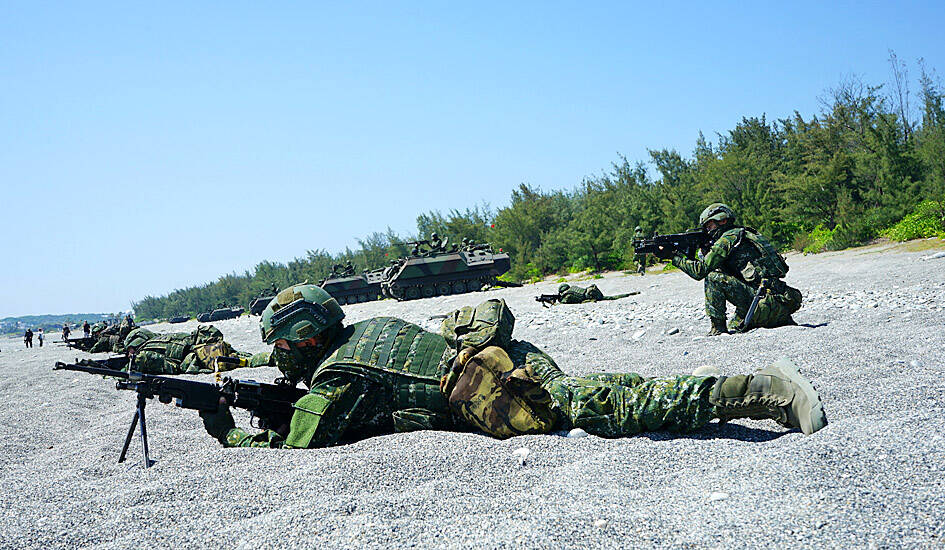The Ministry of National Defense’s proposed amendments to the General Mobilization Act (全民防衛動員準備法) have raised concerns over whether the changes would affect personal liberties.
The act was promulgated on Nov. 14, 2001, and was amended in 2014 and 2019.
The ministry yesterday said the law is focused too much on preparatory measures and lacks regulations defining a chain of command, a legal basis for expropriation during times of war and other issues.

Photo: CNA
The efficacy of the nation’s mobilization efforts is vital to its survival, the ministry said.
Article 13 of the act stipulates that all units in charge of mobilization readiness should ensure that personnel, equipment and facilities are prepared through inspections, inventory management and planning, to ensure the nation can defend itself in the event of an invasion.
A declaration of mobilization shows that a country is entering a time of alert, and necessary measures must be implemented, the ministry said.
The proposed amendments would protect the nation and ensure that Taiwanese can survive an attack, the ministry said, adding that it would consider all opinions before tendering another version for review.
It said it welcomes public input on the amendments, and called for calm and level-minded debates on the issue.
The ministry meanwhile denied a media report that the proposed amendment sought to use child labor to manufacture arms.
A section of the bill states: “School defense groups should assist with the production of military supplies.”
The ministry said the sentence does not mean that students would help manufacture ammunition.
The Chinese-language United Daily News yesterday reported that the Ministry of Education had asked local education offices nationwide to prepare lists of students aged 16 or above for mobilization purposes.
The newspaper said the list would be uploaded to the All-out Mobilization Defense Agency Web site and that the pupils would be used to manufacture munitions.
The ministry said creating such lists was regular practice, adding that the information would be uploaded to the Internet for ease of administrative management.
By law, school defense groups are not responsible for the wartime production of ammunition at military plants, the ministry said, adding that the groups would help manufacture 10 types of products, including food.
Additional reporting by CNA

Taiwan has received more than US$70 million in royalties as of the end of last year from developing the F-16V jet as countries worldwide purchase or upgrade to this popular model, government and military officials said on Saturday. Taiwan funded the development of the F-16V jet and ended up the sole investor as other countries withdrew from the program. Now the F-16V is increasingly popular and countries must pay Taiwan a percentage in royalties when they purchase new F-16V aircraft or upgrade older F-16 models. The next five years are expected to be the peak for these royalties, with Taiwan potentially earning

STAY IN YOUR LANE: As the US and Israel attack Iran, the ministry has warned China not to overstep by including Taiwanese citizens in its evacuation orders The Ministry of Foreign Affairs (MOFA) yesterday rebuked a statement by China’s embassy in Israel that it would evacuate Taiwanese holders of Chinese travel documents from Israel amid the latter’s escalating conflict with Iran. Tensions have risen across the Middle East in the wake of US and Israeli airstrikes on Iran beginning Saturday. China subsequently issued an evacuation notice for its citizens. In a news release, the Chinese embassy in Israel said holders of “Taiwan compatriot permits (台胞證)” issued to Taiwanese nationals by Chinese authorities for travel to China — could register for evacuation to Egypt. In Taipei, the ministry yesterday said Taiwan

‘LIKE-MINDED PARTNER’: Tako van Popta said it would be inappropriate to delay signing the deal with Taiwan because of China, adding he would promote the issue Canadian senators have stressed Taiwan’s importance for international trade and expressed enthusiasm for ensuring the Taiwan-Canada trade cooperation framework agreement is implemented this year. Representative to Canada Harry Tseng (曾厚仁) in an interview with the Central News Agency (CNA) said he was increasingly uneasy about Ottawa’s delays in signing the agreement, especially as Ottawa has warmed toward Beijing. There are “no negotiations left. Not only [is it] initialed, we have three versions of the text ready: English, French and Mandarin,” Tseng said. “That tells you how close we are to the final signature.” Tseng said that he hoped Canadian Prime Minister Mark Carney

POSITIVE DEVELOPMENT: Japan and the US are expected to hold in-depth discussions on Taiwan-related issues during the meeting next month, Japanese sources said The holding of a Japan-US leaders’ meeting ahead of US President Donald Trump’s visit to China is positive news for Taiwan, former Japan-Taiwan Exchange Association representative Hiroyasu Izumi said yesterday. After the Liberal Democratic Party’s landslide victory in Japan’s House of Representatives election, Japanese Prime Minister Sanae Takaichi is scheduled to visit the US next month, where she is to meet with Trump ahead of the US president’s planned visit to China from March 31 to April 2 for a meeting with Chinese President Xi Jinping (習近平). Japan and the US are expected to hold in-depth discussions on Taiwan-related issues during the